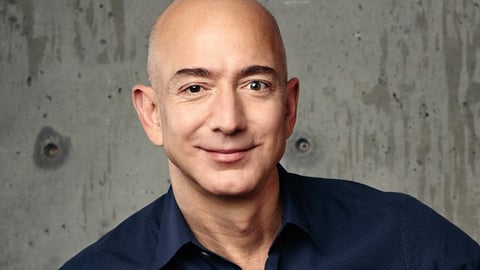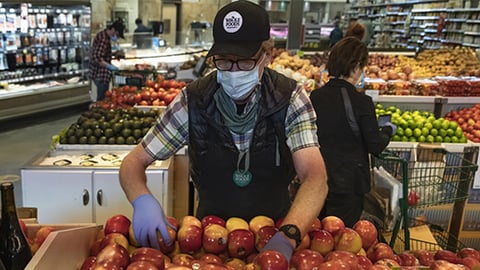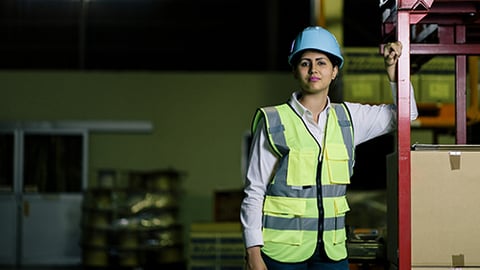Amazon to Spend $4B in COVID-19 Costs
Jeff Bezos is not going to let a pandemic stop Amazon from becoming a trillion-dollar company.
In a first quarter earnings report late Thursday, the founder and CEO of Amazon.com said shareholders should "take a seat, because we’re not thinking small." It looks like Bezos and his company are going to keep building toward a trillion-dollar future by investing to stay ahead of the pandemic and consumer shopping habits.
The first step on that path involves an investment of "some $4 billion in operating profit ... and perhaps a bit more" -- on COVID-related expenses getting products to customers and keeping employees safe, Bezos says.
"This includes investments in personal protective equipment, enhanced cleaning of our facilities, less efficient process paths that better allow for effective social distancing, higher wages for hourly teams, and hundreds of millions to develop our own COVID-19 testing capabilities," he said. "There is a lot of uncertainty in the world right now, and the best investment we can make is in the safety and well-being of our hundreds of thousands of employees. I’m confident that our long-term oriented shareowners will understand and embrace our approach, and that in fact they would expect no less.”
At the same time, Amazon reported record online and physical store sales during the first quarter ended March 31.
Direct e-commerce sales, which Amazon calls "online store sales," were up 25%, a record for the company. That measure includes sales from customers who order goods online for delivery or pickup at physical stores. The record-setting jump in online store sales would seem to indicate a pandemic-related boost for Amazon from grocery delivery and pickup.
Meanwhile physical store sales (i.e., sales at Whole Foods Market) were up 8%, another record for the company (that measure had been flat or decelerating in previous quarters). Amazon says it is "working hard to increase order capacity for Prime Now, Amazon Fresh, and Whole Foods Market."
"We’ve expanded Whole Foods Market grocery pickup from roughly 80 stores to more than 150, adjusted store hours for select locations to focus exclusively on fulfilling online grocery orders during certain times, and have made it easier for customers to see when the next delivery window is available on the Prime Now, Amazon Fresh, and Whole Foods Market homepages."
Amazon has been struggling to keep up with grocery delivery and grocery pickup demand. In early April, the retailer put new grocery delivery and pickup customers for both Amazon Fresh and Whole Foods Market on a waitlist as available time slots have become nearly nonexistent in recent weeks.
Amazon has also implemented safety measures in Whole Foods Market stores, including providing plexiglass barriers between cashiers and customers at checkout, rolling out enhanced cleanliness and sanitation protocols, and enforcing social distancing guidelines. Our Whole Foods Market locations are open to seniors one hour before opening the store to the general public, and we are reserving the first hour of grocery pickup at select Whole Foods Market locations for seniors.
Late Thursday, Whole Foods announced it would be offering free, disposable masks to all customers.
"To help protect the safety and health of our Team Members and communities, we will be requesting customers wear masks in Whole Foods Market stores. Within the next week, we will be offering free, disposable masks to all Whole Foods Market customers nationwide when they arrive at the store to shop. If customers don't already have their own face covering, they will be able to pick up a mask at the entrance of the Whole Foods Market store," a company statement read.
Amazon had previously announced it has "provided over 100 million masks to our global Amazon operations network and Whole Foods Market stores, making them available to all Amazon associates, delivery service partners, Amazon Flex participants, seasonal employees, and Whole Foods Market Team Members. We have enough mask inventory to cover our entire operations and stores network, and we are requiring everyone working in our facilities to take and use them."
On the earnings front, Amazon's huge revenue growth was tainted by COVID-related costs as the pandemic escalated. Amazon’s net sales of $75.5 billion were up 26% over last year. However, net income of $2.5 billion, or $5.01 per share, fell 30% compared to the $3.6 billion, or $7.09 per share in the prior-year quarter.
In an earnings call, CFO Brian T. Olsavsky said the company is spending $300 million on virus testing as part of its $4 billion total COVID-19 expense. While overall demand is strong with consumers stuck at home, Olsavsky said the apparel, shoes and wireless product categories have lagged.
Amazon also said COVID-related costs could contribute to an operating loss of up to $1.5 billion in the second quarter. Amazon said it expects net sales will be between $75 billion and $81 billion for the second quarter, representing growth of as much as 28% over last year.
During the quarter, Amazon hired 175,000 new workers to keep pace with orders, in a testament to the ballooning demand for products off the online marketplace.
In his 2020 “shareowners” letter, Bezos hinted that the company is crafting an updated food retail plan during the COVID-19 outbreak.
Under the Austin, Texas-based Whole Foods Market banner, Seattle-based Amazon is No. 10 on Progressive Grocer’s 2019 Super 50 list of the top grocers in the United States.






